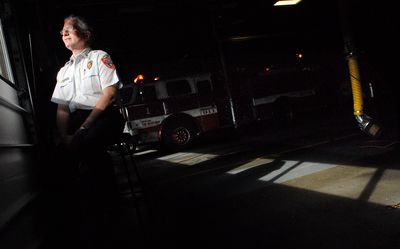Fire chief in it for the long haul
Williams has headed the department for 20 years, and he’s still going strong

As the most college-educated chief in the Spokane Fire Department’s history, Bobby Williams has made some innovative changes, running the agency more like a business, his colleagues say.
But as the first chief hired from outside the agency, the ranks have been slow to support him, and he has often butted heads with the firefighters union, Local 29.
Today, as Williams marks his 20th anniversary at the department’s helm, he says he’s ready for more.
“It’s been an honor for me to be a part of it and be able to serve,” said Williams, who said in a recent interview he’s in for at least five more years, as long as he keeps his health – and the mayor’s support. “I think we still have a lot of work to do.”
Says Capt. Doug Bacon, a veteran firefighter and former union president: “He’s done things we don’t agree with, but guess what? He’s the chief. If you don’t agree with a position, it’s your responsibility to try to change his mind.”
‘In our blood’
Williams was hired in 1988 following a national search after the previous chief’s retirement.
“We ended up stealing him from Billings,” said Terry Novak, then Spokane’s city manager. “He seemed really organized, (had a) very professional attitude toward the fire service, and seemed to work well with (a city) council.”
Williams had been planning for the role from an early age. His father and grandfather were volunteer fire chiefs in Ettrick, Va., and Williams’ family lived across the street from the fire station. “It’s in our blood,” he said.
Two months before his 15th birthday, Williams started as a junior volunteer member at the Ettrick Fire Department. When he told his mentor he wanted to be a chief, “he told me to go get my college degree,” he said.
By 1976, Williams had graduated from Oklahoma State University with a master’s degree in business administration and two undergraduate degrees in the fire service. In college he worked as a firefighter in Oklahoma City and Salisbury, N.C. He then served in Clovis, N.M., as a deputy chief before he was hired, at 29, as chief of the Billings Fire Department in Montana.
Williams was 36 when he and his wife arrived in Spokane.
Series of setbacks
Two years after Williams’ arrival, the union voted no confidence in the chief.
“My assessment was that most of it was associated with change,” said Williams, who had expected the vote. “We were doing things differently.”
The chief used a mapping program to show where fire stations should be located to best serve the community, and several stations were moved, Novak said. Williams also reorganized personnel. The changes were good for the community, but apparently not welcomed or appreciated by the ranks, Novak said.
Union leaders thought Williams should have consulted them more about the changes. The chief said he held meetings and gave firefighters chances to offer input, but they tended to tell him they were fine with the changes and dissent afterward.
“Us older guys, (we) didn’t like some of the changes,” Bacon said. “He was more of an administrator than a firefighter, which bugged the ranks, and I think it still does.”
Local 29 has filed several labor grievances – including concerns over whether the chief followed disciplinary procedures – with City Hall, said Greg Borg, current union president. All those grievances have been resolved.
But Borg has also been disappointed by the drop in on-duty firefighters over the past two decades, he said.The number of on-duty firefighters per day has dropped from 82 to 58, while the call volume has risen.
The chief shares Borg’s dissatisfaction. A lack of revenue has limited the Fire Department’s growth, Williams said.
And one of the toughest things Williams has had to do in his 20 years is lay off 29 firefighters in 2004, he said.
Williams has weathered controversies, including the revelation in 2006 that city-contracted ambulance service American Medical Response had been overcharging patients. The same year, on-duty firefighter Daniel Ross had sex with a 16-year-old girl at a fire station.
“Ross was a criminal matter,” Williams said. “I was outraged by what he did, and the ramifications of that on the hardworking people in the department.”
After a Fire Department employee discovered that AMR was overbilling, Williams said, the problem was pointed out to AMR and then-Mayor Dennis Hession. “My role was to find out what had occurred, how it occurred and how it could be fixed,” the chief said.
Making gains
Union leaders credit Williams for helping to get two bonds totaling more than $36 million approved by voters. The money helped the city rebuild 11 stations and buy new equipment.
Williams also oversaw the purchase of computer-aided dispatch terminals in stations and firetrucks. The computers show real-time information about each call as well as the status of every fire call in Spokane County.
The chief said he’s particularly proud of helping bring the county’s fire and law enforcement communication systems under one roof. Spokane Fire Department employees dispatch for nearly all of the county’s fire districts and departments, in the same facility as city and county police dispatchers and 911.
Williams said his most important goal was improving firefighter safety, which has been accomplished through training and securing up-to-date equipment.
“You always have setbacks, but I think we are real fortunate that we haven’t had any on-duty deaths since I’ve been here,” he said.
Said Bacon: “Williams’ determination to make this a better job is commendable. I always tell people he works 60 hours per week – and who would want that job?”